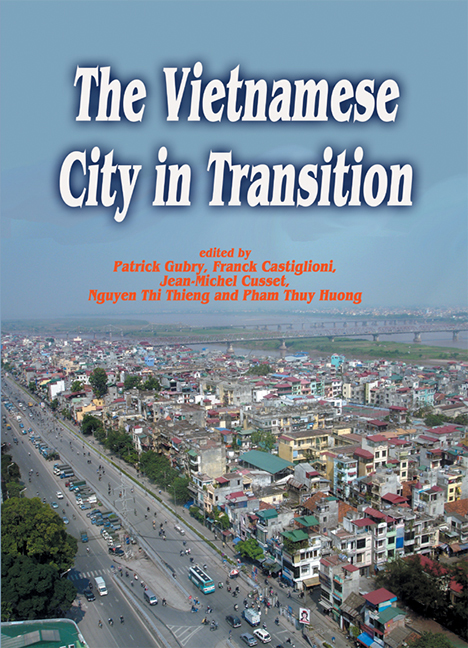Book contents
- Frontmatter
- Contents
- List of Tables
- List of Figures
- List of Colour Plates
- Foreword
- Acknowledgments
- List of Acronyms
- The Editors
- The Contributors
- Introduction: Urban Research in Action: Context, Aims, Directions
- 1 Urban Transition in Vietnam: Its Processes and Stakeholders
- 2 Road System and Urban Recomposition in Hanoi
- 3 Intra-Urban Mobility in Ho Chi Minh City and Hanoi
- 4 Resettlement Issues of Informal Settlement Areas in Ho Chi Minh City: From Large-scale Programmes to Micro-projects
- 5 Changes in Public Water Management: Transition, Compromise, and Innovation
- 6 The Role of Civil Society in Urban Environmental Management
- 7 Assessment of Projects Supported by Official Development Assistance Based on Partnership Formats: From Ho Chi Minh City to Hanoi
- 8 Relations between International Consultants and the Local Engineering Force in Urban Infrastructures
- 9 Conclusion: A Diverse Approach to Research on Urban Issues
- General Bibliography
- Index
- Plate Section
1 - Urban Transition in Vietnam: Its Processes and Stakeholders
Published online by Cambridge University Press: 21 October 2015
- Frontmatter
- Contents
- List of Tables
- List of Figures
- List of Colour Plates
- Foreword
- Acknowledgments
- List of Acronyms
- The Editors
- The Contributors
- Introduction: Urban Research in Action: Context, Aims, Directions
- 1 Urban Transition in Vietnam: Its Processes and Stakeholders
- 2 Road System and Urban Recomposition in Hanoi
- 3 Intra-Urban Mobility in Ho Chi Minh City and Hanoi
- 4 Resettlement Issues of Informal Settlement Areas in Ho Chi Minh City: From Large-scale Programmes to Micro-projects
- 5 Changes in Public Water Management: Transition, Compromise, and Innovation
- 6 The Role of Civil Society in Urban Environmental Management
- 7 Assessment of Projects Supported by Official Development Assistance Based on Partnership Formats: From Ho Chi Minh City to Hanoi
- 8 Relations between International Consultants and the Local Engineering Force in Urban Infrastructures
- 9 Conclusion: A Diverse Approach to Research on Urban Issues
- General Bibliography
- Index
- Plate Section
Summary
The Mutating City: Getting to the Roots
Our research team focused its efforts on analysing a number of key factors behind the urban explosion in Vietnam. Based on multi-disciplinary approaches, we sought to identify and reconstruct the key names, events and development processes associated with it.
A study of local urban phenomena was therefore framed in order to gain insight into the dialectic relationships between cultural continuities and economic developments. This, we felt, would enable us to interpret social transformations in the physical and symbolical forms evident in the spatial mutations.
Against this backdrop, our mission concentrated on a relatively unexplored field in Vietnam — the analysis of spatial cultures, operational modes and thinking patterns of the people involved in local urban development.
Using field observations as our primary tool, we looked for ways to explain the reference points and operations of two specific categories of persons. On the one hand, architects and urban planners who have an academic knowledge of and relationship with the city. On the other hand, the citizens, investors and builders who are a repository of customary knowhow and intuitive, pragmatic, down-to-earth modes of invention.
Cities in Vietnam Today
“No transparency” “can't make head or tail of it”; “nothing certain, always changing”; “inconsistencies everywhere”; “a hodge-podge of ad-hockery and tacky formalisms”; “orders and counter-orders”. Those are a few of the expressions routinely used to describe the urban development scene in Vietnam.
Since our aim was to conduct collaborative research in this area, we took as the starting point for our study of spatial production and the interplay of urban affairs stakeholders, what outsiders had to say on the subject, including foreign investors, international experts and representatives of bilateral or multilateral cooperation arrangements.
Their appraisals highlighted the existence of complex, hard-to-penetrate situations wherein urban spaces are both the obvious venue and means of promoting internationalization processes as well as the brewing pot for the identity reactions that oppose them.
- Type
- Chapter
- Information
- The Vietnamese City in Transition , pp. 7 - 32Publisher: ISEAS–Yusof Ishak InstitutePrint publication year: 2010



